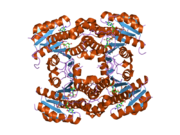Biology:HSD17B8
From HandWiki
 Generic protein structure example |
Estradiol 17 beta-dehydrogenase 8 is an enzyme that in humans is encoded by the HSD17B8 gene.[1][2][3]
In mice, the Ke6 protein is a 17-beta-hydroxysteroid dehydrogenase that can regulate the concentration of biologically active estrogens and androgens. It is preferentially an oxidative enzyme and inactivates estradiol, testosterone, and dihydrotestosterone. However, the enzyme has some reductive activity and can synthesize estradiol from estrone. The protein encoded by this gene is similar to Ke6 and is a member of the short-chain dehydrogenase superfamily. An alternatively spliced transcript of this gene has been detected, but the full-length nature of this variant has not been determined.[3]
References
- ↑ "cDNA cloning of the human homologues of the mouse Ke4 and Ke6 genes at the centromeric end of the human MHC region". Genomics 35 (3): 600–2. Dec 1996. doi:10.1006/geno.1996.0405. PMID 8812499.
- ↑ "The SDR (Short-Chain Dehydrogenase/Reductase and Related Enzymes) Nomenclature Initiative". Chem Biol Interact 178 (1–3): 94–8. Feb 2009. doi:10.1016/j.cbi.2008.10.040. PMID 19027726.
- ↑ 3.0 3.1 "Entrez Gene: HSD17B8 hydroxysteroid (17-beta) dehydrogenase 8". https://www.ncbi.nlm.nih.gov/sites/entrez?Db=gene&Cmd=ShowDetailView&TermToSearch=7923.
Further reading
- "Physical mapping 220 kb centromeric of the human MHC and DNA sequence analysis of the 43-kb segment including the RING1, HKE6, and HKE4 genes". Genomics 42 (3): 422–35. 1997. doi:10.1006/geno.1997.4745. PMID 9205114.
- "Characterization of Ke 6, a new 17beta-hydroxysteroid dehydrogenase, and its expression in gonadal tissues". J. Biol. Chem. 273 (35): 22664–71. 1998. doi:10.1074/jbc.273.35.22664. PMID 9712896.
- "DNA Cloning Using In Vitro Site-Specific Recombination". Genome Res. 10 (11): 1788–95. 2001. doi:10.1101/gr.143000. PMID 11076863.
- "Arrested testis development in the cpk mouse may be the result of abnormal steroid metabolism". Mol. Cell. Endocrinol. 171 (1–2): 83–8. 2001. doi:10.1016/S0303-7207(00)00390-7. PMID 11165015.
- "NotI flanking sequences: a tool for gene discovery and verification of the human genome". Nucleic Acids Res. 30 (14): 3163–70. 2002. doi:10.1093/nar/gkf428. PMID 12136098.
- "Generation and initial analysis of more than 15,000 full-length human and mouse cDNA sequences". Proc. Natl. Acad. Sci. U.S.A. 99 (26): 16899–903. 2003. doi:10.1073/pnas.242603899. PMID 12477932. Bibcode: 2002PNAS...9916899M.
- "The DNA sequence and analysis of human chromosome 6". Nature 425 (6960): 805–11. 2003. doi:10.1038/nature02055. PMID 14574404. Bibcode: 2003Natur.425..805M.
- "The Status, Quality, and Expansion of the NIH Full-Length cDNA Project: The Mammalian Gene Collection (MGC)". Genome Res. 14 (10B): 2121–7. 2004. doi:10.1101/gr.2596504. PMID 15489334.
- "From ORFeome to Biology: A Functional Genomics Pipeline". Genome Res. 14 (10B): 2136–44. 2004. doi:10.1101/gr.2576704. PMID 15489336.
- "The LIFEdb database in 2006". Nucleic Acids Res. 34 (Database issue): D415–8. 2006. doi:10.1093/nar/gkj139. PMID 16381901.
- "Expression of aromatase and 17beta-hydroxysteroid dehydrogenase types 1, 7 and 12 in breast cancer. An immunocytochemical study". J. Steroid Biochem. Mol. Biol. 101 (2–3): 136–44. 2006. doi:10.1016/j.jsbmb.2006.06.015. PMID 16930994.
- "Transcriptional regulation of the human type 8 17beta-hydroxysteroid dehydrogenase gene by C/EBPbeta". J. Steroid Biochem. Mol. Biol. 105 (1–5): 131–9. 2007. doi:10.1016/j.jsbmb.2006.12.106. PMID 17583490.


